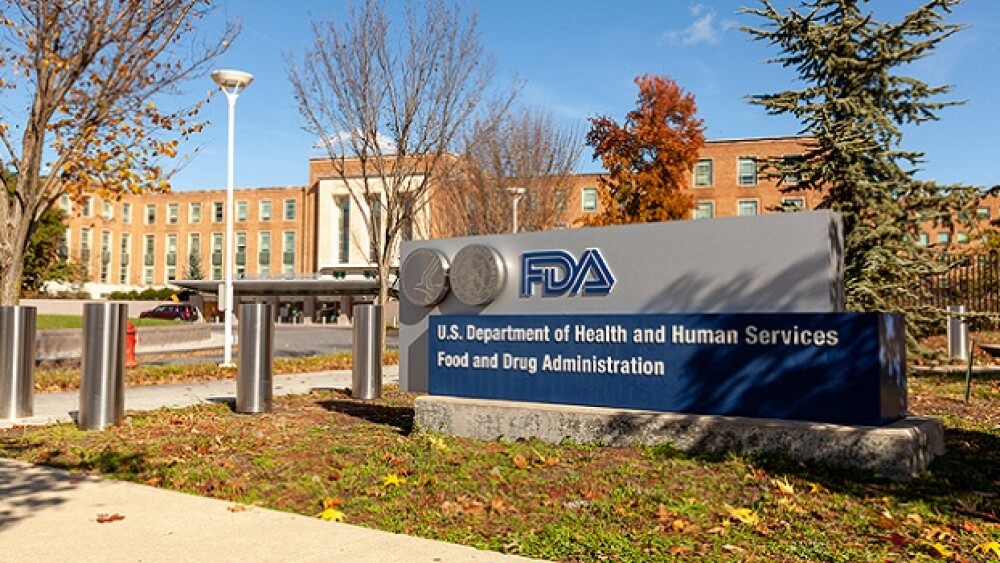The FDA approved Sage and Biogen’s zuranolone Friday as the first oral medication for postpartum depression but declined to approve the application in major depressive disorder.
An FDA sign on a lawn with Autumn leaves/Adobe Stock, Grandbrothers
Shares of Sage Therapeutics were down 46% in premarket trading Monday following the receipt of an FDA Complete Response Letter for its application for zuranolone in major depressive disorder on Friday.
Zurzuvae (zuranolone)—being developed with partner Biogen for both major depressive disorder (MDD) and postpartum depression (PPD)—was approved Friday as the first oral medication for PPD. On a conference call Monday, Sage executives struck a celebratory note, with CEO Barry Greene calling the approval “a historic moment for all women suffering from PPD.”
But MDD was clearly the prize for Sage and Biogen. PPD affects approximately half a million women in the U.S. each year, Greene said, while an estimated 21 million adults had at least one major depressive episode in 2021, according to a survey conducted by the National Institute of Mental Health.
Mike Yee, a biotech analyst at Jefferies, told Reuters that the drug’s “use as a clinical depression treatment represents a more than $1 billion sales opportunity compared with $250 million to $500 million potential for postpartum depression.”
Thus, despite reassurances in its second quarter business update issued Monday that the company believes itself to be “well capitalized,” Greene said Sage is “currently evaluating resource allocation, including pipeline prioritization and a workforce reorganization,” with the goal of extending its cash runway. Sage anticipates operating expenses will decrease in 2024, according to the press release.
Biogen Also Takes a Hit
While Biogen fared much better on the stock market—the bigger biotech’s shares fell just 3% in premarket trading Monday—Baird analyst Brian Skorney told Reuters the FDA’s decision to not approve zuranolone for a much larger cohort of patients with clinical depression, along with the drug’s “strict safety warnings” in PPD, “is still a strike against Biogen’s management.”
Safety information on the Zurzuvae’s label includes a boxed warning around driving and guidance stating that the drug “can be abused or lead to dependence.”
In its Complete Response Letter, the FDA stated that the NDA in MDD did not provide “substantial evidence of effectiveness” to support its approval and that further research would be required.
In the Phase III CORAL study, zuranolone given with a standard of care antidepressant showed a statistically significant reduction in depressive symptoms after three days of treatment, an effect that was sustained after two weeks. However, in an earlier Phase III study, the drug failed to distinguish itself from placebo.
On Friday, Biogen CEO Chris Viehbacher said the partners would “thoroughly review the feedback from the FDA on the use of zuranolone in MDD to determine next steps.”
Greene declined to elaborate on this statement during Monday’s conference call, saying only that the companies are “reviewing the feedback and evaluating next steps.”
Yee told Reuters that Biogen is unlikely to “quickly move forward on another late-stage study for MDD,” given its focus on saving costs and recent announcements of job cuts.
In a statement on Friday, Greene expressed his disappointment with the FDA’s decision in MDD, saying the companies were “highly disappointed for patients, particularly amid the current mental health crisis.” He reiterated this sentiment on Monday’s call and added that Sage and Biogen “learned late in the review cycle the FDA’s view on approvability of zuranolone in MDD,” a view he said Sage does not agree with.
Heather McKenzie is a senior editor at BioSpace. You can reach her at heather.mckenzie@biospace.com. Follow her on LinkedIn and Twitter @chicat08.






